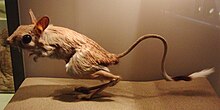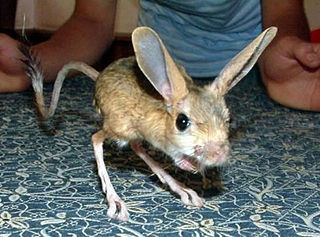| Jaculus Temporal range: Middle Miocene - Recent | |
|---|---|
 | |
| Jaculus orientalis | |
| Scientific classification | |
| Domain: | Eukaryota |
| Kingdom: | Animalia |
| Phylum: | Chordata |
| Class: | Mammalia |
| Order: | Rodentia |
| Family: | Dipodidae |
| Subfamily: | Dipodinae |
| Tribe: | Dipodini |
| Genus: | Jaculus Erxleben, 1777 |
| Type species | |
| Mus jaculus | |
| Species | |
Jaculus blanfordi Contents | |
The genus Jaculus is a member of the Dipodinae subfamily of dipodoid rodents (jerboas). Jaculus species are distributed in desert and semi-arid regions across northern Africa, the Sahara, the Horn of Africa, Arabia, the Middle East, and Central Asia.
Collectively, the species within the genus may be commonly referred to as "desert jerboas", although this more particularly applied to the lesser Egyptian jerboa (Jaculus jaculus). [1]











